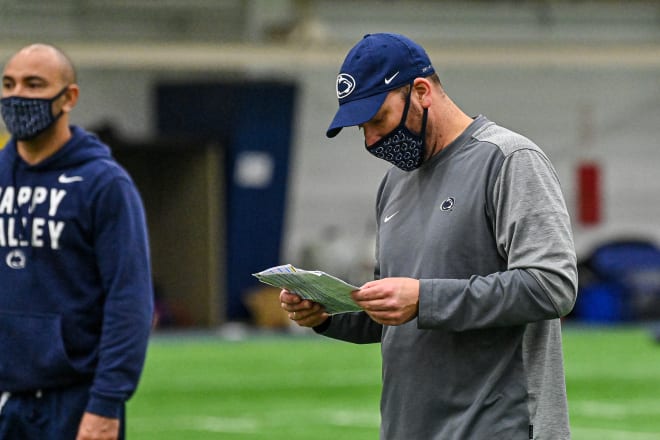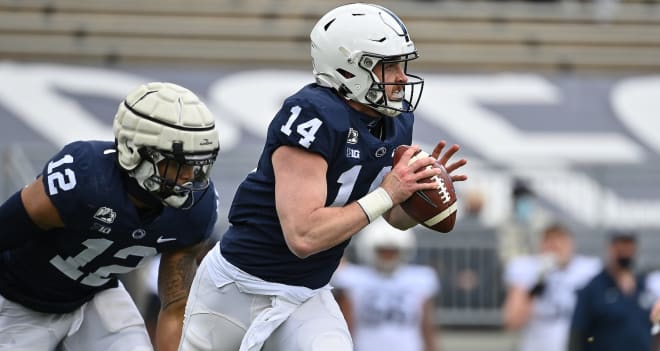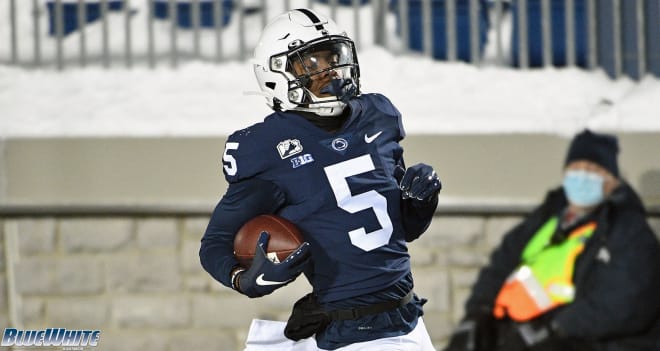Penn State Football Summer Interview: Mike Yurcich
With Penn State head football coach James Franklin set to meet with reporters later this week at Big Ten Media Days in Indianapolis, we're sharing our exclusive one-on-one coach and coordinator interviews conducted earlier this summer.
Mike Yurcich has a way of making offensive football seem simple. Distilled down to its essence, his approach is to score points in bunches and make it impossible for opponents to keep pace.
But the college game isn’t nearly so straightforward, and Yurcich also has a way of making its complexity seem… well… complex. During a recent interview, Yurcich went into a lengthy, color-coded disquisition about the importance of matchups and how an “orange” offense might expect to fare against a “blue” or “green” or “purple” defense. Asked whether his players knew what those colors signified, Yurcich laughed. “I just made that s--t up,” he said. “I don’t even know what those colors mean.”
Yurcich is one of the game’s most successful offensive coordinators, having directed high-scoring units at Oklahoma State, Ohio State and Texas. Now he’s bringing his high-intensity approach to Penn State. BWI’s Nate Bauer had an opportunity to speak to him in June about his priorities and teaching methods.
Here’s what he had to say:
NOT A SUBSCRIBER? Use promo code BWI30 for FREE access to our premium content for 30 days

BWI What would be your elevator-pitch approach to offensive football?
YURCICH Score as many points as you can. Turn it over as infrequently as humanly possible. Secure the football. Play with good sportsmanship. Be tough. Be smart. Be skilled. Play fast. Be tough. Be tough. And score.
BWI How many of those are achievable?
YURCICH I don’t know. I just hope we win them all.
BWI How do you get there?
YURCICH It’s a process, that’s for sure. I don’t think there’s any magic word that you can use or anything that anybody has not thought of. I mean, if we had that answer, then we would always be the number one offense in the country and people would get bored and wouldn’t even watch football anymore.
So I think it’s a process. It’s ongoing. It’s ever-changing. It’s a very humbling game. I’ve watched a bunch of football, and it just seems like everything changes, everything develops. Defenses catch up rather fast. They evolve. So you’ve got to continue to evolve. You cannot rest. You have to play with a sense of urgency. You have to have really good communication systems. I think that’s key. I think your players [need to] understand what things are called and how things are called and why things are called.
Your language is so important and your culture. It’s so important to be on the same page, and we as coaches must understand that and program our guys to understand that our system, our language, and how we talk to one another, it has to be clear, it has to be concise, it has to be meaningful. One word can mean a lot of different things to our players, but we all have to make sure that it means the same thing to all players.
So that’s part of your culture, it’s part of how you program it, it’s part of your system. Once you have that down, I think then it’s a matter of repetition and making sure that you have a good plan moving forward, being able to recognize how to anticipate, and knowing what problems may exist, and being able to anticipate those problems.
RELATED: Texas & Ohio State reporters give their takes on Mike Yurcich
BWI What progress do you think you’ve been able to make since you got here?
YURCICH That’s a great question. I think it’s something, I think it’s up, it’s going to be maybe a little bit down, and it’s up, it’s down. But as long as it keeps on trending this way [that’s positive]. That’s what we want, the growth on an incline. As long as that happens over time, we’re good.
There are going to be good days and there are going to be not-so-good days. The thing that you want to see is more banking of back-to-back good days. So if we have a good day, then a bad day, good day and bad day, good day and bad day, well, sooner or later, you want to say good day, good day, good day, bad day, good day, good day, good day, good day, bad day. And then it continues to build in that direction.
BWI Would it be fair to say that you prioritize the preparation side of the game as much as, if not more than, the skills that players bring to the field?
YURCICH I think that it has to go hand-in-hand. I think you have to have your everyday skill developers. So every day you’re trying to develop them and rein in on those skills, and then you’re trying to make sure that those skills show up within your schemes, right? You want the fundamentals to be shown every day, to whatever schemes that you’re running.
I think the more that you can carry over your game plan, the better, so we’re going to try to run the same concepts as much as possible to create that learning and mastery. At the same time, you want to be hard to defend, so the more that we can get better at, the harder we’re going to be to defend.
BWI Everyone is so captivated by the passing game, but how do you mesh the running game with it, and what importance do you place on effectively running the ball?
YURCICH I think one of the most interesting things about that is that in football, you can simulate a full-speed pass game way easier. What’s difficult is to get good at the running game based on our rules in the NCAA – the minimum amount of practices you get to tackle and to even have your full equipment on, and to be able to thud up, and to be able to simulate the full-force blocking and the impacts and the true cutting that’s necessary, the running through tackles, the laying out. How many tackles are there where defenders are leaving their feet? I mean, every play. But in practice, it’s very rare that we actually leave our feet to make plays.
So it’s very difficult, in my opinion, to get good at the run game just based on practice. I think your run game will get better over time throughout the season because you’re getting actual practice in games, if you will. And that’s a tough pill to swallow because we have to get good at the run game, and we have to be physical and come downhill. I mean, this is Penn State, who are we kidding? We’re going to run the football with our physical mindset that’s going to be our identity.
If you’re going to play the piano and try to get good at the piano, what do you have to do? You have to play the piano. What’s the best way to play the piano? When the lights are on. The recital. The more recitals you have, the more pressure is on you, the more you have to play in your tuxedo, the better you’re going to get. That’s a fact. That’s what’s going to happen. It’s when the lights are on. [If] we can simulate the game and really play real football, we’re going to get better at that. But you’ve got to simulate the game as much as you possibly can. That’s the challenge.
BWI How much of that toughness and offensive identity is shaped by what you have up front?
YURCICH We’re going to be tough, and we’re going to be physical, and we’re going to run the football. There’s no question about it. Up front, I think at Penn State, we’re always going to have a physical offensive line. We’re always going to have a talented offensive line. We don’t see that changing. That’s who we are, it’s what we’ve been, and we’re going to continue to do that. So to me, that really doesn’t factor in, like, what if we’re not... what does that mean? We’re going to be. That’s our mindset – positive attitude, our core value number one. And so our positive attitude, and who we are, and what we’re going to be is, we’re going to be a very strong, tough, physical, athletic, overwhelming offensive line.
BWI Sean Clifford described you as intensely devoted to the game. Is it fair to say the same of him?
YURCICH Yeah, I think Sean’s intensity is very, very good. Very high, I should say. He’s a high-energy guy. He loves it. His “want to” is super good. He wants to be an excellent quarterback and it’s very important to him. It’s right there.

BWI What does his development through the summer look like? From where he was in the spring to where you feel he needs to be in the fall, what needs to happen?
YURCICH A lot of it’s on him. The summer work, there are a lot of cut-ups available for him, and I think you’ll see guys grow a lot depending on how much they put into it.
I think what’s really interesting is to sit down and listen to a quarterback talk about how they watch tape. If you’re the quarterback coach, you’re sitting there and you’re wondering: They’ve got all this time and they’re spending hours in the film room on their own, but what does that mean? How are they processing the information and are they using that time well? Do they know what they’re looking at? Do they know how to watch film?
So I sit there and I’m just like, OK, talk through how you’re seeing this video on the screen. What are the things that you’re asking yourself? Just go ahead, open up and talk, think out loud as you’re watching this tape. You’d be amazed.
Sean, I think, is very good at it. But with young quarterbacks in general, you have to make sure that if they’re spending X amount of hours in the facility watching tape or watching tape in general, whether it’s on their phone on ThunderCloud or whatever, that they do have a process, that they understand what they’re looking at. And then it’s like, OK, this is open, so I’m going there. Done. Well, that was my first read. OK, he did this, so I threw it to the number one progression and now it’s on to the next play. No, no, no. Peel it back. Go back, go back, go back. So now, let’s just imagine if the first read was taken away by the flat defender. Let’s just say they buzz. Well, now use your eyes and try to imagine what that would look like if you had to progress on.
Sometimes you just assume that of course they would do that, but they don’t know that. Sometimes you have to remind yourself to do that. It’s a fun process. And the more you’re in it sometimes, the longer you coach, I think sometimes the more you assume the players know. You have to strip back down every year and continue to just ask question after question after question. As simple as you think it is as a coach, because you’ve been through it five million times, it’s only the 20th time they’ve heard it, and they need to hear it a thousand times.
RELATED: Drawing on 2020's tough lessons, Clifford finds confidence this offseason
BWI Is how to watch film the first thing you have to teach when you come in?
YURCICH Well, I don’t think you have the luxury of doing that first. You have to install first. … That’s the way that I like to teach it. There has to be a progression, to a degree. At the same time, I feel that you have to piece it together and give them a little bit, then draw it back, and then a little bit more, and then draw it back. Then bounce around a little bit. And then at a certain time, it has to be, OK, since we have a general idea of how we call personnel, how we call formations, what this means, what that means, now let’s start getting into protections, for example. When you start just talking about protections, now you have to have that be systematic in your approach. You have to be very regimented, you have to talk in terms of formulas, if you will, rather than broad strokes and philosophical. You have to really get concrete with it, I believe.
BWI Is there such a thing as too much? How do you figure out what a group can handle and what’s beyond its grasp, given the timeline?
YURCICH I believe you always want to teach the offense when you get in. So they’re going to naturally be overwhelmed at first. There are going to be a lot of mistakes. But then in the spring, practices 10 through 15, you really want to maximize those practices, so you just scale it back and try to really get some rhythm and get some execution done so you have some confidence. But over the summer months, you still want to be able to get into your cut-ups and have enough taught so that you feel good about rolling into your third down, medium, long, extra-long, your red zones, your score zones. How are we going to attack cover zero, how are we going to attack cover one, how are we going to attack two-man, how are we going to attack bear? You want to have all those categories covered. You may have not covered it A through Z, but at least you have something to introduce it over the summer, teach it from, have concepts coached up to where your guys have a baseline.

BWI What have your impressions been of the receivers?
YURCICH I don’t know how much I’m able to really cover with those guys yet. I think we need some game reps before I get into all of the evaluations of everybody right there. I like our group. I like our mindset. I think we have a bunch of hard workers. There’s some talent there. And there’s a lot of room to improve.
BWI Does your group of running backs bring the depth and versatility you need?
YURCICH I think along the same lines as not being able to really get good at the run game because of the limitations of practicing, it’s the same thing with us with an evaluation of running backs. We have a deep group, we know that. And then how much can they push one another and who’s going to emerge? We’re excited to see that happen.
We need some guys to be able to stand out. Anytime our offense has been successful, it’s because we’ve had a tremendous running game. That starts up front, and it starts with that tailback being able to make the extra guy miss, or making the extra two guys miss, or whatever it may be. Whether they put their shoulder down to run through them or whether they bounce it and run around them, either way. But we’ve got to find that guy and let that competition [determine] who rises and who’s able to emerge from that.
Inside the Den: Penn State running backs, tight ends take steps forward
BWI What’s your approach to the tight end position and its place in the modern game?
YURCICH I think tight end is the most unique position on the football field because they have to do everything. They have to block, they have to line up as receivers sometimes, they have to know the routes, they have to know pass protections, they have to know run blocking, they have to know every scheme. They even have to know conversions on routes. So tight end, to me, is a very, very unique position and one that can be utilized very well.
What factor into how you utilize them are matchups. How does the defense match up against your personnel changes? How do they match up in man-to-man coverage? If they’re in zones, how do they line up in certain formations where you can get an advantage in the run game. Those are very important things to ask as you game plan and try to gain an advantage.
*******
• Talk about this article inside The Lions Den
• Watch our videos and subscribe to our YouTube channel
• Learn more about our print and digital publication, Blue-White Illustrated
• Follow us on Twitter: @BWIonRivals, @NateBauerBWI, @RivalsSnyder, @DavidEckert98, @GregPickel, @ThomasFrankCarr
• Follow us on Instagram
• Like us on Facebook

